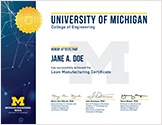SIX SIGMA CERTIFICATIONS
Lean Six Sigma Black Belt - Manufacturing
Home » Professional Education » Six Sigma Certifications » Lean Six Sigma Black Belt – Manufacturing
Key Information
Course Dates
Time Commitment
Approximately 120 self-paced hoursNot ready to commit?
Subscribe for email updates on future offerings and get a program brochure.
SIX SIGMA CERTIFICATIONS
Submit info below and we’ll email you our Six Sigma program brochure.
By submitting this form, you are consenting to receive marketing emails from Nexus. You may unsubscribe at any time.
By clicking 'Get Program Information' you are agreeing to receive emails from Nexus.
Earn your Black Belt from the University of Michigan. 100% online.
Effective quality analysis requires finding the right tool for the right problem. Using a blend of case studies and examples drawn from manufacturing companies, this online course provides advanced continuous improvement and quality engineering analysis skills used in Lean Six Sigma problem solving.
Manufacturing Track
The Black Belt – Manufacturing course focuses on applications primarily drawn from manufacturing companies. Project results include increased throughput, reduced lead time, reduced material handling time, and more.
LEARNING OBJECTIVES
- Understand variability through the graphical representation of data
- Describe a process visually through process mapping techniques
- Apply DMAIC problem solving process toward process improvement at the Green Belt level
- Interpret test results and draw conclusions based on data
- Develop recommendations and control plans to improve processes
- Complete a process improvement project outside of class that demonstrates the application of the full DMAIC methodology
PROGRAM OVERVIEW
The following modules are required. You will also receive access to optional supplemental material.
- Course Overview (A) and Six Sigma Overview (B)
- DMAIC Problem Solving Process and DEFINE Phase
- Process Maps (Review of SIPOC/Swim Lane; Current and Future State Maps)
- Value Stream Mapping (VSM) Analysis (Value Stream Process Redesign, Current State VSM, Value Add Timeline, Future State VSM)
- Value Stream Productivity Analysis (Takt, Nominal vs. Effective Process Time, Detractors, Operator Bar Charts, Capacity and Utilization)
- Sampling, Graphical Analysis Tools, and Descriptive Statistics (Normality, Hypothesis Tests)
- Introduction to Minitab (Tutorial)
- MEASURE: Measure the Current State – Continuous Outputs (Yield, PPM Defective, Mean vs. Variation)
- Measure Current State – Defect Count Data (DPMO, Rolled Yield, Tabulation, Check Sheets, and Pareto)
- Minitab Tutorial – Measure Phase
- Measuring Current State Using Survey Methods
- Assessing Process Stability – Variable Control Charts (X-Bar/Range, I/MR)
- Statistical Process Control: Attribute Charts (e.g., p-chart, u-chart)
- Minitab Tutorial – SPC
- Process Capability Indices and Analysis – Cp/Cpk, Pp/Ppk; PPM, Normal/Non-Normal Distributions
- Sigma Level and Six Sigma (Supplemental)
- Minitab Tutorial – Process Capability Analysis
- Data Collection and Qualitative Process Analysis (Data Collection, Cause and Effect, P-Diagram)
- Two Group Hypothesis Tests (F-tests, t-tests, 2 Proportion, ANOVA)
- One-Factor ANOVA – Operating Windows
- Power and Sample Size Planning (Optional)
- Minitab Tutorial – Hypothesis Testing
- IMPROVE Phase – Countermeasures and Short Term Verification
- IMPROVE Phase – Standardized Work and Load Leveling
- CONTROL – Methods of Control, Visual Controls, and Control Plans
- Failure Mode and Effects Analysis (FMEA) – Improving Methods of Control (Detection)
- Nonparametric Hypothesis Tests
- Categorical Data Analysis (Measures of Association)
- Minitab Tutorial – Categorical Data Analysis
- Measurement Systems Analysis (MSA) – Part I (Accuracy and Gage R&R Studies)
- Measurement Systems Analysis (MSA) – Part II (Repeated Measurement and Attribute Agreement)
- Minitab Tutorial – MSA
- Two Variable Analysis – Simple Linear Regression/Correlation
- Multiple Regression/Stepwise Regression/Best Subset
- Binary Logistic Regression Analysis
- Minitab Tutorial – Regression Analysis
- Multi-Vari Studies
- Principles of Design of Experiments (DOE)
- Part A: DOE – 2k Factorial and
- Part B: DOE Fractional Factorial, 3k and 2k Center Point
- Minitab Tutorial – DOE
- Mixed Level DOE and General Linear Model (GLM)
- Minitab Tutorial – GLM
- Tolerance Analysis and Adjustment
- Project Identification and Selection Techniques
- DMAIC Project Management
- Course Summary and DMAIC Gate Review Process
- Certification Exam Review
Estimated: 120 self-paced hours
- 90 hours (approximately) for lecture recordings and exercises
- 20-40 hours for project work
All requirements must be completed within 365 days after your start date. If you do not complete the course within one year of your start date, you will be required to re-enroll at a reduced cost of $500.
This is a self-paced online course consisting of 46 lecture modules with 10 test exercises (multiple choice tests to complete after each learning module) and 2 case study assignments. Most lecture recordings are approximately one hour in length. While the course is self-paced, we recommend completing two sessions/week.
Lean Six Sigma DMAIC analysis may be applied to a vast array of process improvement opportunities. Participants are expected to complete a project to practice and apply course concepts.
Participants pursuing their University of Michigan Lean Six Sigma Black Belt Certification are required to:
- Complete all required online lecture modules
- Complete all testing exercises and case studies with an overall cumulative score > 80%
- Obtain an 80% or above on Black Belt Certification Exam
- Obtain approval of Black Belt Project Proposal by U-M faculty
- Successfully complete Black Belt Project (reviewed by U-M faculty)
Upon successful completion, you will be mailed your University of Michigan Lean Six Sigma Black Belt Certification.
Participants are expected to have knowledge in statistical concepts and linear statistical models along with their application to data analysis. Recommended prerequisite topics include:
- Descriptive statistics
- Sampling and distributions (e.g., Normal)
- Simple linear regression and correlation
- Hypothesis testing
Successful completion of an undergraduate Statistics and/or Linear Statistical Models course is desired. Completion of Green Belt certification is desired but not required, especially if candidates have background in the above prerequisite topics.
To view technical requirements, click here.
Administrative/Online Technical Support
Support staff are available via phone and email to help with administrative and technical issues during our normal business hours (Monday through Friday 8:00 a.m. to 5:00 p.m. Eastern Time).
Content Questions/Certification Project Support
Candidates are welcome to contact the course instructors for content questions and project support. The instructors will provide support via e-mail, phone consultation, and/or online videoconferencing.
Software Requirements
The assignment exercises and case studies involve the extensive use of Minitab (not Minitab Express) Statistical Software for analysis. Lectures and assignments are developed for Minitab or equivalent software (SPSS, STAT SOFT, SAS).
If your organization does not offer Minitab please email [email protected] and Nexus will help provide access for this course.
1. Install VMWare Fusion for Mac. Download: https://caenfaq.engin.umich.edu/vmap/what-is-vmap
2. Create a Windows Virtual machine using VMWare Fusion.
3. Install Minitab (Full version) inside the newly created Virtual Windows machine.
Six Sigma Content Subscription
Interested in maintaining access to course materials after you earn your certification? Purchase a 1-year Six Sigma Content Subscription and retain access to your Canvas account.
INSTRUCTIONAL TEAM

Pat Hammett, PhD
- Lead Faculty, Six Sigma Programs
- Associate Chair of Masters Education, Integrative Systems + Design
- Lecturer, College of Engineering

Don Lynch, PhD
- Instructor, Nexus
- Vice President of Quality, Strategy, and Transformation, SKF USA Inc.
What's Next?
CERTIFICATE
Master Black Belt in Operational Excellence
Gain program management and technical problem-solving skills to be an effective continuous improvement leader.



